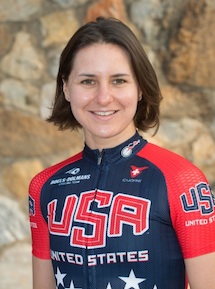By Connor Collins
Phi Beta Kappa celebrates the liberal arts and sciences as the foundation on which members from diverse backgrounds can build to fulfill their myriad goals and interests. Part of the value of a liberal arts and sciences education is the broad array of opportunities that graduates face, and the freedom this allows them to explore their interests and to discover what they want to do and how they want to contribute to society. Megan Guarnier (ΦBK, Middlebury College, 2007) exemplifies how a liberal arts and sciences education prepares one to seize the reigns, to lead, to pursue one’s passion and talent to the fullest. Guarnier recently competed in cycling for the United States at the 31st Olympiad in Rio de Janeiro, Brazil.
Guarnier’s official Team USA profile details her background and recent cycling performances. Born in Glens Fall, New York, Guarnier made the short trip to Vermont to attend Middlebury College. She graduated summa cum laude and Phi Beta Kappa with a degree in neuroscience. Middlebury College is home to the Beta of Vermont Chapter of Phi Beta Kappa, established in 1868. At Middlebury she first became active in competitive cycling. Her personal website notes that she switched to being a cyclist from being an All-American swimmer due to nagging shoulder injuries. The switch hardly slowed her down. By 2011, Guarnier won her first major international cycling competition, the Giro della Toscana in Italy. A string of top-ten finishes in major competitions led Guarnier to the 2016 Olympic Games where she competed in the women’s road race, an approximately 18 mile-long event. Guarnier finished in eleventh place.
After she didn’t make the cut for the 2012 Olympics in London, Guarnier strove for Rio in 2016. She says of the experience: “After 2012, my coach and I decided that the Olympics was the goal, and we would try to make the automatic selection.” Her bronze medal finish in the 2015 World Championships Road Race ensured her roster spot on the USA cycling team.
However, the path to the Olympics can be a financial burden for some athletes. For every NBA player on the national basketball team who makes millions there are others who train and labor for little or no financial compensation. Guarnier was one of the latter when she started racing professionally after college. Her profile in the Wall Street Journal describes how she supplemented competitive racing with a part-time job at a nuclear power plant, crunching numbers to determine the probability of human and system errors. That way, she could make a living while pursuing her passion for cycling.
President and Chief Executive Officer of USA Cycling Derek Bouchard-Hall says of Guarnier’s racing ability, “If you can’t get away from her and you can’t beat her for the sprint to the line, you can’t beat her.” Guarnier’s coach, Corey Hart, and her teammate on the Boels-Dolmans cycling team, Christine Majerus, echo Bouchard-Hall’s assessment.
Guarnier’s successes in cycling and in the classroom at Middlebury demonstrate her passion for competing and, often, winning. The curiosity to try cycling after years of being a successful swimmer gave her the opportunity to represent her country at the Olympics, something many people dream of, but few achieve. Her background in the arts and sciences, in critical thinking, analysis, and in the scientific method enabled Guarnier to pursue her passion. It gave her freedom to not only race, but to become one of the world’s best road cyclists. Today, Guarnier is still racing. According to her Team USA bio, she also works at an engineering company part-time, and hopes to continue her studies in neuroscience, earning her MD or PhD.
Connor Collins is a senior at Case Western Reserve University double majoring in political science and sociology. Case Western Reserve University is home to the Alpha of Ohio Chapter of Phi Beta Kappa.




